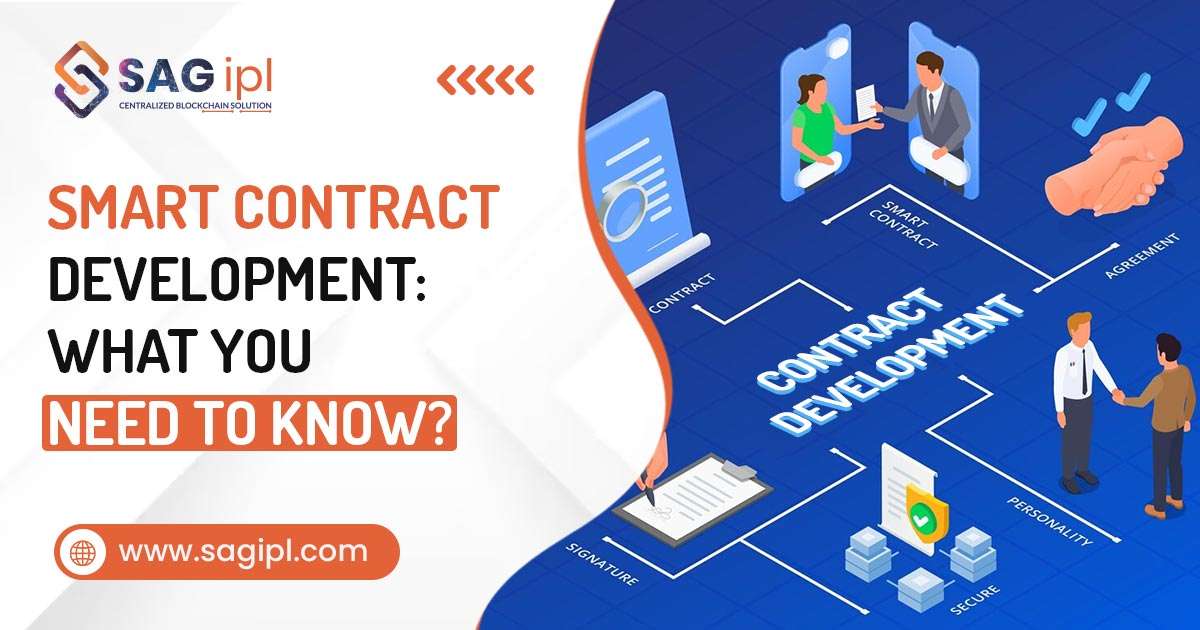Smart Contracts are a core component of blockchain networks. They can be used to create self-executing digital agreements on the blockchain for a variety of transactions and trades. Smart Contracts are developed in blockchain-compatible programming languages such as Solidity, Vyper, and Rust. If you’re seeking information about blockchain smart contract development, this article has everything you need.
As of 2025, over 40% of all blockchain applications utilize smart contracts, with Ethereum holding the largest market share in smart contract usage, processing more than 1 million smart contracts daily.
Smart Contract Development: A Brief Overview📝🔍💻

Originally created for blockchain-based financial transactions, smart contracts have, over time, expanded their reach and reliance in various industries. Today, these digital contracts are being used by organizations, merchants and professionals in a range of industries, including but not limited to, supply chain management, insurance and healthcare, real estate, and others.
The best thing about smart contracts is that they can self-execute upon meeting certain pre-programmed conditions. This reduces the need to rely on a middleman or third party and increases transparency in critical transactions across industries such as finance and payments, supply chain, etc. Backed by blockchain technology, smart contracts are highly secure, fast, accurate and cost-efficient.
Smart Contracts leverage blockchain’s decentralization feature to enable parties located anywhere in the world to transact peer-to-peer and anonymously. They support all sorts of digital transactions from p2p payments and money transfers to real estate dealings, asset purchases, shopping, lending, and investments.
It involves creating a smart contract for a particular blockchain platform, project or task. If you’re looking to hire a blockchain smart contract development company, contact SAG IPL today.
What are Smart Contracts and how do they work?🔗💻
A smart contract is a digital agreement created in the form of a computer program that can automatically execute or take certain actions according to the terms predefined in its code.
One crucial stage for smart contract developer is clearly defining the conditions for the contract to self-execute.
Smart Contracts are generally based on blockchain technology and are written in the same code as the underlying blockchain. They operate on the blockchain network and use its features like decentralization to enable anonymous and peer-to-peer transactions within the ecosystem.
Nearly all transactions within the blockchain ecosystem are powered by smart contracts. So, when sending tokens over the blockchain, you execute a smart contract that verifies and processes this transaction without a middleman.
How Smart Contracts Automate Agreements
A smart contract is a blockchain program that includes code with the terms of an agreement that is agreed upon by the transacting parties, usually outside the blockchain. This is a self-executing program, meaning that the code will execute on its own once the terms defined in the agreement are fulfilled. Like, if X event occurs, then Y action is taken.
For example, when making an online payment, the contract can be programmed to “verify the sender’s credentials and the amount in their wallet and process the payment only If both conditions are met.”
Key components and structure of a smart contract
- Participants: Transacting parties or systems
- State: Current status of the contract
- Functions: Actions supported by the contract program
- Rules: These are conditions written into the contract’s code that must be fulfilled for functions to be enforced.
Benefits of Smart Contracts Development💡🔒🚀
Smart contracts are the backbone of transactions in a blockchain ecosystem. Their use ensures middleman-free transaction verification and execution, thereby reducing human errors and failures in different types of transactions.
Some common benefits of smart contracts are as follows:
- Fast Execution – all transactions are verified and processed by the contract in real time without human involvement, ensuring quick execution.
- Improved Efficiency – Blockchain smart contracts are more efficient than manual transaction processing, in terms of security, cost and speed.
- Low Cost – With the removal of middlemen and increased transaction speed, the cost of transactions is reduced.
- Enhanced Security – Smart contracts are backed by blockchain’s unparalleled security features, including encryption for all data and transactions, which helps reduce fraud.
- Increased Transparency – Like all blockchain transactions, smart contracts are public, immutable and verifiable, ensuring full transparency in all agreements.
Read Also : How Much Does It Cost to Build a Blockchain Project (From Scratch)? A Complete Guide
Other than that, smart contracts are highly accurate, completely paperless and back all transactions up in the blockchain. Moreover, they reduce the need to trust any third party to execute a transaction.
Common Uses of Smart Contracts📊💼🔒
Originally created for peer-to-peer financial transactions, like cross-border payments, smart contracts have now reached many industries and are used in various applications across banking, supply chain management, healthcare, insurance, real estate, NFTs, digital identities, elections, retail, data security, and more. Here are some examples of real-world use cases of smart contracts.
✔️Finance and banking
Nearly all kinds of financial transactions can be efficiently governed using smart contracts, eliminating costly third parties and increasing security in transactions such as loans, cross-border payments and insurance.
✔️Supply chain management
Smart contracts can be created to manage end-to-end supply chains, from production and processing to delivery and payments, ensuring full transparency in supply chain management and automating actions on non-compliance to prevent fraud.
✔️Insurance and healthcare
In the insurance and healthcare industry, smart contracts have many possible applications, from allowing data sharing between institutions for clinical trials to verifying the authenticity of medical records and preventing insurance fraud.
✔️NFTs
Non-fungible tokens use smart contracts to enable artists and owners to seamlessly tokenize and monetize their assets such as music records, labels, photos, etc.
✔️Real Estate
Smart contracts are making premium real estate investments accessible to everyone through real estate tokens that represent fractional ownership in properties. This also enables owners to generate passive income by renting out their fraction of a property. Smart contracts can be used to manage rent collection from tenants and fair distribution among co-owners.
Choosing the Right Platform for Smart Contract 🌐💡🔗Development
The first step in the smart contract creation process is to choose the right platform for your digital contract.
A smart contract platform is a blockchain system that supports the development of self-executing contracts. Some top choices for a smart contract development platform are as follows:
Read Also: Explore Different Types of Cryptocurrency Development
Public blockchains:
- Ethereum (top tier)
- BNB Smart Chain (second generation)
- Solana
- Cardano
- Polkadot
Private blockchains:
- Hyperledger Fabric
- Corda
Key factors to consider when choosing a smart contract platform include its security features, popularity, past record, scalability, cost, performance, and strength of its developer community. Each smart contract platform has its unique features, so choose one that best fits your needs and goals.
Choosing A Smart Contract Development Language💻🖋️🔍
A smart contract language is a programming language in which the code of the smart contract is written. It is usually the same language in which the underlying blockchain system has been developed.
Solidity is the most popular and common blockchain programming language used by Ethereum Virtual Machine (EVM) and other compatible blockchain platforms. Its features include a robust developer community, fast and efficient, easy-to-learn, built-in protective measures, and advanced libraries and tools. Smart contracts written in Solidity are efficient, secure, clear, and reliable.
Vyper, Rust, Yul, Cairo, and Move are other popular languages for smart contract development.
Not all blockchains support all of the above programming languages, which means you’ll have to find the best language based on the blockchain system. Some blockchain languages are based on existing programming languages such as C, C++, Python, etc. So, if you’re already familiar with a coding language, chances are that you’ll easily learn to code on blockchain as well. Solidity, for instance, is similar to JavaScript, while Vyper is similar to Python.
How to Develop a Smart Contract (Step-by-Step Guide)📝💻🔗
Since Solidity is the most popular language for blockchain smart contracts, we’ll today discuss the smart contract development process with Solidity. There are the following steps in creating a smart contract using Solidity:
1. Planning and Defining Requirements
At this stage, we plan the entire smart contract creation process, including the selection of the right development platform, programming language, IDE, digital wallet and testnet.
Each of the above components is crucial for successful smart contract development. From choosing the right blockchain and language to selecting an efficient integrated development environment (IDE) and crypto wallet, the SAG IPL team constructs a foolproof plan to build your cutting-edge smart contract.
We use the Ethereum blockchain along with Solidity language to build highly efficient contracts. Remix is a web-based IDE that we use for writing secure EMV-compatible smart contracts in Solidity. It is super easy to use and anyone with knowledge of Solidity can work with it.
MetaMask is a Web3 wallet that we use to interact with the Ethereum blockchain for implementing smart contracts. We’ve already created a MetaMask wallet and will use the Sepolia testnet to test the smart contract with free ETH.
Read Also: Discord Channel Ideas for 2025 and Beyond
2. Writing the Smart Contract Code
At this stage, we begin writing the blockchain contract code on the Remix (IDE) platform.
Visit the Remix IDE website (https://remix.ethereum.org/) and open the “contracts” folder. Create a new file, name it “Scontract.sol” and save the file.
Open the file “Scontract.sol” and paste the following code in the blank space:
// SPDX-License-Identifier: MIT
pragma solidity >=0.8.2 <0.9.0;
contract Scontract {
uint data;
function set(uint x) public {
data = x;
}
function get() public view returns (uint) {
return data;
}
}
The above code contains the following information:
Line 1: SPDX license identifier (for copyright for public contracts)
Line 2: Declaration of the Solidity compiler version
Line 3: Contract declaration (`Scontract`)
Line 4: Declaration of variable to store data when executing contract functions (`uint data`)
Line 5 to 11: Implementation of smart contract functions (`set` to set data and `get` to retrieve data)
3: MetaMask, Sepolia and Testnet Tokens
Before we can deploy the Solidity smart contract built in the previous step, we have to test it on a compatible testnet. We use the Sepolia testnet for this purpose. To perform test transactions, we get some free testnet ETH from a third-party faucet. You’ll need to provide your MetaMask wallet address to mint free tokens. Once you have tokens in your wallet, you can start testing your smart contract on Sepolia.
4: Compiling and Deploying the Smart Contract
Return to the Remix IDE website. Go to Solidity compiler and compile the `Storage.sol` contract. Now, you can deploy the contract using MetaMask on the Sepolia testnet.
Go to “Deploy & Run transactions” and select “Injected Provider – MetaMask” under ENVIRONMENT. Once you have added your MetaMask wallet, click the ”Deploy” button. Confirm the transaction and pay using testnet tokens.
Once the transaction is approved, you’ll see a message in Remix.
Now, you can test each contract function separately to see if it’s working.
Hiring A Smart Contract Development Company🛠️📜
In this article, we have only discussed the process of creating a simple smart contract with basic functionalities. Developing a more complex contract with advanced functionalities and features would be much more complicated, especially for beginners. This is where a professional smart contract developer comes in.
When hiring a smart contract developer for your project, be sure to consider your particular project requirements, goals and budget. You want someone who has good experience in blockchain development and can be relied upon. Check the reviews and read client feedback when hiring a smart contract builder.
Read Also: ERC-20 vs. TRC-20 vs. BEP-20 Crypto Token Standard – Which One Is The Best?
At SAG IPL, we have experience in creating smart contracts with basic to advanced functionalities for a diverse array of applications across industries like finance, real estate, healthcare, e-voting, and more. Our team includes talented and seasoned blockchain developers with extensive experience in Solidity and EVM, among other blockchain platforms. We use cutting-edge and secure tools such as MetaMask for EVM-compatible wallets and Remix for high-end blockchain IDE to build highly efficient smart contracts suitable for every purpose. Contact SAG IPL today to discuss your requirements with an expert, for FREE.
Smart Contracts Are the Future of Secure and Efficient Agreements🔒💡
Smart contract technology has brought a much-needed change to the way agreements were executed traditionally. By automating the execution of digital agreements in a decentralized and secure manner, smart contracts introduce efficiency and transparency and reduce the need for intermediaries in transactions across industries ranging from finance and healthcare to supply chain management.
As you learn to develop a basic smart contract in this article, you should know that creating more complex contracts for advanced transactions requires an in-depth understanding of blockchain technology and knowledge of programming languages such as Solidity. A professional blockchain developer or smart contract development company can help you here. If you’re looking to hire one, contact SAG IPL today.



![How to Tokenize Property Using Blockchain Technology [2026] How to Tokenize Property Using Blockchain Technology](https://blog.sagipl.com/wp-content/uploads/2023/09/How-to-Tokenize-Property-Using-Blockchain-Technology-300x158.jpg)


![Explore Different Types of Cryptocurrency Development [2026] Different Types of Cryptocurrency Development](https://blog.sagipl.com/wp-content/uploads/2024/02/Different-Types-of-Cryptocurrency-Development-300x158.jpg)
